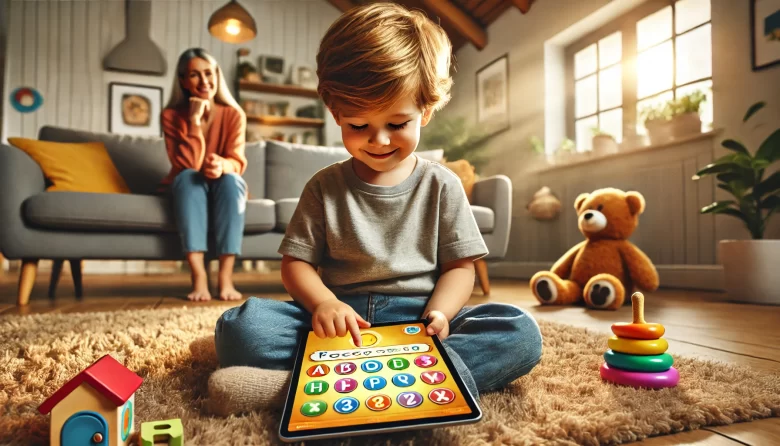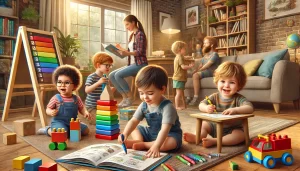Technology is playing an increasingly important role in early childhood education. With the right educational apps, children can develop essential cognitive, language, and problem-solving skills in a fun and interactive way. However, not all apps are beneficial—some are merely digital distractions, while others lack meaningful educational value.
In this in-depth guide, we’ll explore everything you need to know about selecting high-quality educational apps for young children. From understanding the science of learning through apps to reviewing the best educational apps by category, this article will equip you with the knowledge to make informed decisions and use technology to its fullest potential in your child’s education.
Understanding the Role of Educational Apps in Early Childhood Learning
How Digital Learning Has Changed Early Education
With the rise of mobile devices, children today are exposed to digital learning earlier than ever. Educational apps are designed to provide engaging, hands-on experiences that help young learners grasp important concepts such as:
- Basic literacy skills (letters, phonics, storytelling)
- Mathematical thinking (numbers, shapes, counting)
- Problem-solving (puzzles, logic games, creative tasks)
- Fine motor skills (drawing, tracing, tapping interactive elements)
- Social and emotional development (learning empathy through storytelling)
When chosen correctly, educational apps can complement traditional learning methods, reinforcing concepts through play and interactivity.
The Science Behind Learning Through Apps
Not all screen time is bad. Research suggests that well-designed educational apps can enhance a child’s learning experience by promoting active engagement and reinforcing knowledge retention.
What Makes an Educational App Effective?
Studies in child development and digital learning highlight three key factors that make educational apps truly beneficial:
- Active Engagement:
- Apps should encourage participation, not passive watching.
- Features like interactive challenges, puzzles, and drawing tools promote active learning.
- Meaningful Content:
- Apps should be aligned with early childhood development principles.
- Games that build on real-world concepts (like counting everyday objects) are more effective.
- Adaptive Learning:
- The best educational apps adjust to a child’s progress, offering customized difficulty levels.
How Children Learn Best Through Technology
- Repetition Strengthens Learning: Apps that encourage repeated practice help young learners reinforce skills.
- Multisensory Learning is More Effective: Apps combining visuals, sounds, and touch-based interactions engage multiple senses, improving retention.
- Parental Involvement Matters: Kids learn best when parents or caregivers guide them through digital experiences.
Criteria for Selecting High-Quality Educational Apps
Not all apps marketed as “educational” are truly beneficial. Here’s a step-by-step checklist to evaluate whether an app is worth your child’s time.
Age-Appropriateness
📌 Check the recommended age group before downloading. The app should match your child’s cognitive abilities and developmental stage.
Clear Educational Goals
📌 A good educational app should have a well-defined purpose:
- Does it focus on reading, math, or creative problem-solving?
- Does it align with early childhood curriculum?
Engaging Without Overstimulating
📌 Bright colors and fun animations can be engaging, but excessive stimuli (fast movements, loud music) can be distracting or overwhelming.
No Ads, No Disruptions
📌 Many free apps come with pop-up ads and in-app purchases, which can be disruptive or inappropriate for children. Look for ad-free or paid versions.
Parental Controls & Progress Tracking
📌 Features like:
✅ Time limits to prevent excessive screen time
✅ Parental dashboards to monitor learning progress
✅ Offline access for learning without Wi-Fi
Encourages Real-World Learning
📌 Apps that bridge digital learning with real-world activities (e.g., asking kids to find and count objects at home) are more effective.
Positive Reviews & Recommendations
📌 Look for reviews from:
✅ Parents and teachers
✅ Educational organizations like Common Sense Media
The Best Educational Apps for Young Children (By Category)
📖 Best Literacy & Reading Apps
- Endless Alphabet – Fun word puzzles that teach vocabulary.
- Khan Academy Kids – Free, comprehensive early learning in reading and storytelling.
- Starfall ABCs – Teaches phonics and letter recognition interactively.
🔢 Best Math & Logic Apps
- Monkey Math School Sunshine – Simple math games for preschoolers.
- DragonBox Numbers – Turns numbers into interactive characters for hands-on learning.
- Moose Math – Encourages problem-solving through fun challenges.
🎨 Best Creativity & Art Apps
- Toca Boca Series – Encourages open-ended creative play.
- Draw & Tell – Allows kids to illustrate and record their own stories.
- Busy Shapes & Colors – Teaches problem-solving through shape exploration.
🌍 Best Science & Nature Apps
- Tinybop Explorer’s Library – Interactive learning about the human body, space, and the environment.
- MarcoPolo Ocean – A digital sandbox for exploring marine life.
- PBS Kids Science Games – STEM-focused learning games.
Balancing Screen Time with Other Learning Activities
Too much screen time can have negative effects. The American Academy of Pediatrics (AAP) recommends:
✅ For ages 2-5: No more than 1 hour of screen time per day.
✅ For ages 6+: Screen time should be balanced with physical activity.
Best Practices for Parents:
✔ Set a daily time limit for apps.
✔ Combine digital learning with hands-on activities.
✔ Engage in co-play – ask questions while your child uses the app.
Parental Involvement: How to Guide and Monitor Digital Learning
🌟 Tips for Parents:
- Sit with your child and interact with the app together.
- Ask them open-ended questions about what they’re learning.
- Use apps that track progress and provide learning reports.
Future Trends in Educational Technology for Young Children
🎯 What’s Next?
- AI-Powered Learning Apps – Personalized learning paths based on progress.
- Augmented Reality (AR) in Learning – More interactive and immersive learning experiences.
- Voice-Controlled Learning Assistants – Apps using voice commands to teach kids new concepts.
Final Thoughts
Educational apps can be a powerful tool in early childhood learning—when used correctly. By choosing high-quality apps and maintaining a healthy balance between screen time and real-world learning, parents can provide their children with a meaningful and engaging educational experience.
Now that you have this guide, you’re ready to make informed choices about your child’s digital learning journey!




